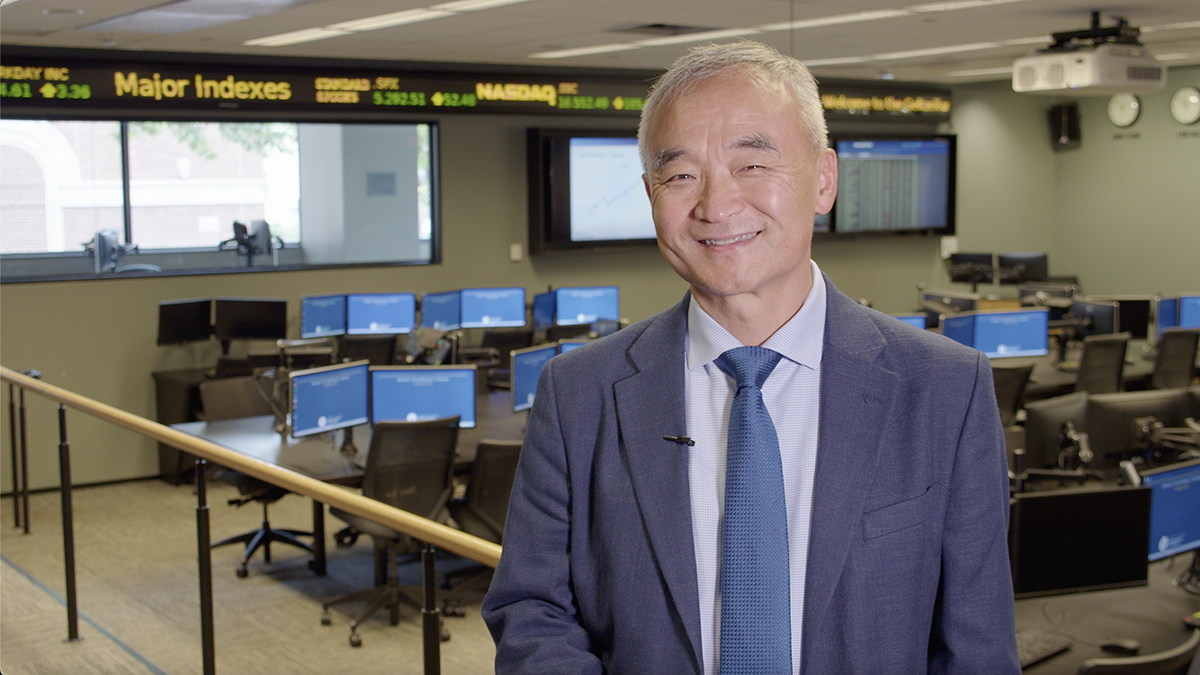article written by Andrew Sharp
As the Alfred Lerner College of Business and Economics gears up to address rapid changes in both business and academics, Dean Oliver Yao sees momentum.
He took over leadership at the University of Delaware’s Lerner College after the end of the 2022-23 academic year, seeking to increase innovation in the college’s programs and proactively prepare students — and Lerner itself — for a life transformed by artificial intelligence and other digital technologies.
Yao has kept busy over the past year, not only helping get this innovation underway but learning all about his new job, and adapting to the complexities of managing a large college.
As he looks back on his first year, these are some of his highlights.
Building connections
When he arrived at Lerner, Yao saw the people here as one of the college’s strengths. His time here has confirmed that impression. He enjoys working with talented colleagues, he said, and his positive interactions with the students have been rewarding. He was touched by the way students cheered him on during convocation, and by their greetings in the hallways during the school year.
Yao has connected with the local culture in other ways too. A passionate soccer fan and player, he enjoyed following the UD men’s team last year during its winning season and trip to the CAA Tournament. He’s also become a fan of the UDairy Creamery. “That was really good.”
New courses focused on digital transformation
“We’ve been spending a lot of time innovating our curriculum, undergrad and grad,” Yao said.
The fruits of that effort include the addition of a major and minor in financial technology, and a master’s in financial services analytics. Lerner has also created a new online graduate certificate teaching generative AI for business.
That certificate saw immediate interest, with dozens of students signing up when it debuted in April, and more enrolled already for the fall. Students learn about using large language models (LLMS) in a business setting, how to build their own models to fit their needs, and other practical ways to put generative AI to use.
These innovations are the first steps in a broader expansion, Yao said. We are exploring the possibility of expanding the graduate certificate into a degree program in the near future, while also extending AI-focused education more broadly, reaching the undergraduate programs.
Listening and planning
The second half of the academic year saw the launch of a strategic planning process that involved brainstorming sessions and input from the various departments at Lerner. It was a grassroots effort that brought input from faculty, staff, alumni, students and even community members, Yao said.
“We’re trying to improve all aspects of Lerner so that we can improve our students’ success,” Yao said.
The next step in the process, turning all that input into a long-term strategic plan, is underway now.
Momentum on research
A key focus from the beginning for Yao has been lifting Lerner’s research status even higher and increasing its impact. “Anytime you’re in a top position as a research college, your reputation will follow,” he said last year.
Yao sees success in this area already. He points to one of the leading rankings for business school research, the University of Texas at Dallas Top 100 listing. This ranking assigns a score based on business schools’ publications in top journals over five years. (It updates each year.)
Lerner moved to 83rd among North American universities in the latest ranking, up from 93rd in the 2016-2020 listing (when the College first appeared on the list). Yao has hopes of moving the College into the higher ranges in the next few years. Yao acknowledged that this is only one of the research rankings, and other rankings or metrics can also demonstrate our research reputations as well.
“We’re going to continue our upward trajectory on research and provide more support to our faculty,” Yao said.
As part of that, the College launched Lerner Research Grants last year to support more research, and “we received huge enthusiasm from our faculty,” Yao said, with more than 30 applications.
Looking ahead
As Yao builds on his first year and continues to put his stamp on the Lerner’s vision, he has a number of other items on his to-do list.
For one, he wants to continue planning for Lerner’s financial future to ensure the College is on a sound footing.
Part of that will include increasing graduate enrollment. “I’m hoping we’re going to launch some new graduate programs, and we can increase the (enrollment) number by a lot.”
Also underway are efforts to make the many co-curricular programs even stronger, from networking events to career coaching and professional development, Yao said.
He’s looking into ways to improve the college’s buildings and facilities as well.
As he reviewed the year’s accomplishments, Yao kept returning to a common theme: “We’ll do more.”




